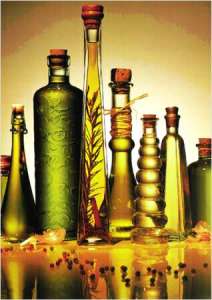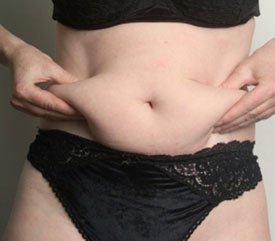07/31/2009
The Nurses Health Study evaluated over 88,000 women aged 34 to 59 over 24 years. They recently reported that women who drank 2 or more sweetened beverages a day had a 35% increase in their risk for heart disease (American Journal of Clinical Nutrition, April 2009). Sweetened beverages in this study included: Caffeinated and non-caffeinated colas and carbonated beverages with sugar. The increased risk was not observed with artificially sweetened drinks. The researchers believe that the sweetened beverages can increase triglycerol levels and this might be the cause of the heart problems.
Enjoying an occasional sweetened beverage may be okay but – Moderation is Key!
For more heart healthy info and New Women’s Heart Health book “Take Charge: A Woman’s Guide to a Healthier Heart” visit www.heart-strong.com
 Leave a Comment » |
Leave a Comment » |  "heart attack", Belly fat, Children heart disease, diabetes, Diet, food label, Heart Disease, Heart disease young women, Heart Health, Heart Healthy Diet, heartstrong, Nutrition, obese, Premature heart disease, Women and Heart Disease | Tagged: "heart attack", "heart healthy", "portion size", caffeine, cola, food label, healthy role model, Heart Disease, Heart Health, heart healthy habits, kids health, metabolic syndrome, non-caffeinated cola, Nutrition, soda, sugar, sweetened beverages, weight gain, Women and Heart Disease, women and high blood pressure, women and hypertension |
"heart attack", Belly fat, Children heart disease, diabetes, Diet, food label, Heart Disease, Heart disease young women, Heart Health, Heart Healthy Diet, heartstrong, Nutrition, obese, Premature heart disease, Women and Heart Disease | Tagged: "heart attack", "heart healthy", "portion size", caffeine, cola, food label, healthy role model, Heart Disease, Heart Health, heart healthy habits, kids health, metabolic syndrome, non-caffeinated cola, Nutrition, soda, sugar, sweetened beverages, weight gain, Women and Heart Disease, women and high blood pressure, women and hypertension |  Permalink
Permalink
 Posted by heartstrong
Posted by heartstrong
07/29/2009

Rachel Ray talks about EVOO all the time, but is it really worth the money? And what exactly is extra-virgin olive oil?
“Extra-virgin” means the olives and pits are ground together into a mash. This mash concoction is then subjected to several hundred pounds of pressure producing an oil and water. The water is removed and what is left is called “virgin oil”. If it contains less than 1% acid and has a superior taste and color it is called “extra-virgin” oil. Only the best green olives, which take on the personality of the soil from Spain, Greece, Italy and California, make up extra virgin olive oil.
Olive oil connoisseurs claim that each oil has its own taste and aroma similar to wine. But unlike wine, olive oil does not age well and should be consumed within one year (best taste is within first 2 months).
Whether you use an expensive brand of extra-virgin olive oil or a less expensive brand remember that all olive oils are considered heart healthy.
For more heart healthy info visit www.heart-strong.com
 2 Comments |
2 Comments |  "heart attack", cholesterol, Diet, food label, Heart Disease, Heart Health, Heart Healthy Diet, Nutrition | Tagged: "heart healthy", cholesterol, EVOO, extra virgin olive oil, food label, healthy role model, Heart Health, heart healthy habits, heartstrong, Nutrition, olive oil, Women and Heart Disease |
"heart attack", cholesterol, Diet, food label, Heart Disease, Heart Health, Heart Healthy Diet, Nutrition | Tagged: "heart healthy", cholesterol, EVOO, extra virgin olive oil, food label, healthy role model, Heart Health, heart healthy habits, heartstrong, Nutrition, olive oil, Women and Heart Disease |  Permalink
Permalink
 Posted by heartstrong
Posted by heartstrong
07/26/2009

Regular “moderate” alcohol consumption is associated with a lower risk for heart disease and strokes (1 drink per day for women and 2 drinks per day for men). But heavy alcohol intake can increase the risk of strokes. Excessive chronic alcohol intake has previously been shown to increase the risk of high blood pressure and heart failure. A study published in the journal Stroke (October 2008) found that binge drinking (common among young people) can also significantly increase the risk of stroke.
Over 15,000 men and women between the ages of 25 and 64 were followed for a ten year period. Binge drinking was defined as 6 or more alcoholic beverages in one session for men or 4 or more drinks for women. Binge drinking was reported to be an independent risk factor for strokes.
Younger people need to understand the potential dangers of binge drinking. Remember moderation is key!
For more heart healthy info visit www.heart-strong.com
 1 Comment |
1 Comment |  "heart attack", Blood Pressure, Children heart disease, Diet, Heart Disease, Heart disease young women, Heart Health, Heart Healthy Diet, high blood pressure, hypertension, men and heart disease, Premature heart disease, Stroke, Women and Heart Disease, Women and Stroke | Tagged: "heart attack", "heart healthy", alcohol, binge drinking, Heart Disease, Heart Health, heart healthy habits, high blood pressure, hypertension, kids health, Stroke, weight gain, Women and Heart Disease, women and high blood pressure, women and hypertension |
"heart attack", Blood Pressure, Children heart disease, Diet, Heart Disease, Heart disease young women, Heart Health, Heart Healthy Diet, high blood pressure, hypertension, men and heart disease, Premature heart disease, Stroke, Women and Heart Disease, Women and Stroke | Tagged: "heart attack", "heart healthy", alcohol, binge drinking, Heart Disease, Heart Health, heart healthy habits, high blood pressure, hypertension, kids health, Stroke, weight gain, Women and Heart Disease, women and high blood pressure, women and hypertension |  Permalink
Permalink
 Posted by heartstrong
Posted by heartstrong
07/24/2009
Energy drinks are touted to improve stamina and cognitive function. These beverages often contain caffeine and sugar which can lead to an elevation in blood pressure and heart rate. A recent study (published in the Annals of Pharmacotherapy, April 2009) evaluated the effects of energy drinks of 15 healthy 20 to 39 year olds. The participants drank 2 cans (containing 100 mg of caffeine each) daily for one week. Blood pressure and heart rate were monitored before, during and after the energy drinks were consumed. The heart rate increased approximately 8% on day 1 and 11% on day 7.
While the blood pressure increased approximately 8% on day 1 and almost 10% on day 7. These increases in heart rate and blood pressure would definitely be detrimental to people with known high blood pressure or heart disease but may also over time lead to heart problems in younger healthy adults.
If you are going to consume “energy drinks” you should do so in moderation !! Better yet avoid them if possible.
For more heart healthy info visit www.heart-strong.com
 1 Comment |
1 Comment |  "heart attack", Blood Pressure, Children heart disease, Diet, food label, Heart Disease, Heart disease young women, Heart Health, Heart Healthy Diet, high blood pressure, hypertension, men and heart disease, Nutrition, Premature heart disease, Women and Heart Disease | Tagged: "heart attack", "heart healthy", caffeine, energy drinks, food label, Heart Disease, Heart Health, heart healthy habits, high blood pressure, kids health, Nutrition, overweight, weight gain, weight loss, Women and Heart Disease, women and high blood pressure, women and hypertension |
"heart attack", Blood Pressure, Children heart disease, Diet, food label, Heart Disease, Heart disease young women, Heart Health, Heart Healthy Diet, high blood pressure, hypertension, men and heart disease, Nutrition, Premature heart disease, Women and Heart Disease | Tagged: "heart attack", "heart healthy", caffeine, energy drinks, food label, Heart Disease, Heart Health, heart healthy habits, high blood pressure, kids health, Nutrition, overweight, weight gain, weight loss, Women and Heart Disease, women and high blood pressure, women and hypertension |  Permalink
Permalink
 Posted by heartstrong
Posted by heartstrong
07/21/2009

Remember all calories count! Since there is no nutritional label on your alcoholic beverage you might not think about the calories you are ingesting. These calories can add up over time even if you are only having a couple of beers or glasses of wine each week.
Wine (6oz glass) = 120 calories
Light beer (12 oz) = 100 calories
Regular beer (12 oz) = 150 calories
Wine cooler (12 oz) = 225 calories
Liquor, 80 proof (1.5 oz) = 100 calories
If you are having a mixed drink you also need to calculate what you’re combining your alcohol with.
Small pina colada (5 oz) = 245 calories
Margarita = 157 calories
Long island iced tea = 230 calories
These are estimates since every bartender mixes drinks a little different and portion sizes may vary. Remember alcohol does have some heart healthy benefits but in moderation: women one glass per day, men no more than two glasses per day. Cheers!!
 4 Comments |
4 Comments |  Belly fat, Diet, food label, Heart Disease, Heart Health, Heart Healthy Diet, men and heart disease, Nutrition, obese, Overweight/Obese, Women and Heart Disease | Tagged: "heart healthy", "portion size", alcohol, Belly fat, food label, Heart Disease, Heart Health, heart healthy habits, liquid calories, Nutrition, overweight, weight gain, weight loss |
Belly fat, Diet, food label, Heart Disease, Heart Health, Heart Healthy Diet, men and heart disease, Nutrition, obese, Overweight/Obese, Women and Heart Disease | Tagged: "heart healthy", "portion size", alcohol, Belly fat, food label, Heart Disease, Heart Health, heart healthy habits, liquid calories, Nutrition, overweight, weight gain, weight loss |  Permalink
Permalink
 Posted by heartstrong
Posted by heartstrong
07/17/2009

We’ve all heard that belly fat is the bad fat that can increase our risk for heart disease, stroke and diabetes but, can it also cause an earlier death?
A recent study followed about 360,000 Europeans (New England Journal of Medicine, Nov 2008) and found that people with big bellys were in fact more likely to die prematurely.
- Men with a waist greater than 40 inches and women with a waist greater than 35 inches were twice as likely to die prematurely than men and women with smaller waists
- Each 2 inch increase in waist circumference was associated with an approximately 17% increase in death in men and 13% increase in women !!
Get those tape measures out if you do not already know your waist measurement. If you are overweight set short-term achievable goals of losing 1 inch at a time!!
For more heart healthy info visit www.heart-strong.com
 2 Comments |
2 Comments |  Uncategorized |
Uncategorized |  Permalink
Permalink
 Posted by heartstrong
Posted by heartstrong
07/15/2009
 Not getting a good night’s sleep can make you feel grumpy and tired the following day, but can it also raise your blood pressure?
Not getting a good night’s sleep can make you feel grumpy and tired the following day, but can it also raise your blood pressure?
A group of 578 adults were followed over five years to assess for sleep patterns and blood pressure changes. Shorter sleep duration and poor quality sleep were associated with higher systolic and diastolic blood pressure readings both at baseline and also over the 5-year follow-up period (Archives of Internal Medicine, June 2009).
Higher blood pressures were seen in males (especially African Americans) that also had the shorter sleep durations. This finding may partially explain the higher incidence and risk for hypertension in African American men.
The current recommendation for adults is 7 hours of sleep per night.
The take home message is to make sure you are getting adequate, restful sleep every night. This will help control blood pressure in those with hypertension and can help prevent the development of hypertension in people with normal blood pressures.
ZZZZZZZzzzzzzzzzzz……………..good night now!
For more heart healthy info visit www.heart-strong.com
 1 Comment |
1 Comment |  "heart attack", Heart Disease, Heart Health, heartstrong, high blood pressure, hypertension, men and heart disease, Overweight/Obese, Sleep, Women and Heart Disease, Women and Stroke | Tagged: "heart healthy", healthy role model, Heart Disease, Heart Health, heart healthy habits, heartstrong, high blood pressure, hypertension, lack of sleep, menopause high blood pressure, obese, overweight, Sleep, sleep deprivation, sleep disturbances, Stroke, Woman's Guide to a Healthier Heart, Women and Heart Disease, women and high blood pressure, women and hypertension |
"heart attack", Heart Disease, Heart Health, heartstrong, high blood pressure, hypertension, men and heart disease, Overweight/Obese, Sleep, Women and Heart Disease, Women and Stroke | Tagged: "heart healthy", healthy role model, Heart Disease, Heart Health, heart healthy habits, heartstrong, high blood pressure, hypertension, lack of sleep, menopause high blood pressure, obese, overweight, Sleep, sleep deprivation, sleep disturbances, Stroke, Woman's Guide to a Healthier Heart, Women and Heart Disease, women and high blood pressure, women and hypertension |  Permalink
Permalink
 Posted by heartstrong
Posted by heartstrong
07/12/2009
Who would not want to prevent their own heart attack? Research has shown that 80% of heart attacks are preventable by making healthy lifestyle changes. Hopefully you are going for regular physical exams and discussing your risk factors for heart disease with your healthcare provider. But how well are our doctors doing at preventing future heart attacks?
A study published in the May 2009 issue of the International Journal of Clinical Practice suggests that our doctors need to focus more attention on preventing disease rather than just treating disease. This study evaluated over 13,000 adults and found that only 19% of people who developed heart disease had it picked up during a routine screening. That means that 81% of the people who developed heart disease only had it diagnosed when they became symptomatic.
The moral of this story:
1) Get regular physical exams
2) “Know your numbers” (blood pressure, cholesterol, weight, waist circumference)
3) Discuss your risk factors (initiate the discussion with you healthcare provider and find out what you can do to decrease your risk of a heart attack)
“Take Charge: A Woman’s Guide to a Healthier Heart” is a new book discussing heart disease and stroke risk factors and heart healthy lifestyle habits that can help you prevent heart disease. For more info visit http://www.heart-strong.com
 5 Comments |
5 Comments |  "heart attack", Blood Pressure, cholesterol, diabetes, Health Care Reform, Heart Disease, Heart Health, heartstrong, men and heart disease, Menopause, Overweight/Obese, Women and Heart Disease, Women and Stroke | Tagged: "heart attack", "heart healthy", healthy role model, Heart Disease, Heart Health, heart healthy habits, heartstrong, symptoms, Woman's Guide to a Healthier Heart, Women and Heart Disease |
"heart attack", Blood Pressure, cholesterol, diabetes, Health Care Reform, Heart Disease, Heart Health, heartstrong, men and heart disease, Menopause, Overweight/Obese, Women and Heart Disease, Women and Stroke | Tagged: "heart attack", "heart healthy", healthy role model, Heart Disease, Heart Health, heart healthy habits, heartstrong, symptoms, Woman's Guide to a Healthier Heart, Women and Heart Disease |  Permalink
Permalink
 Posted by heartstrong
Posted by heartstrong



 Posted by heartstrong
Posted by heartstrong 









